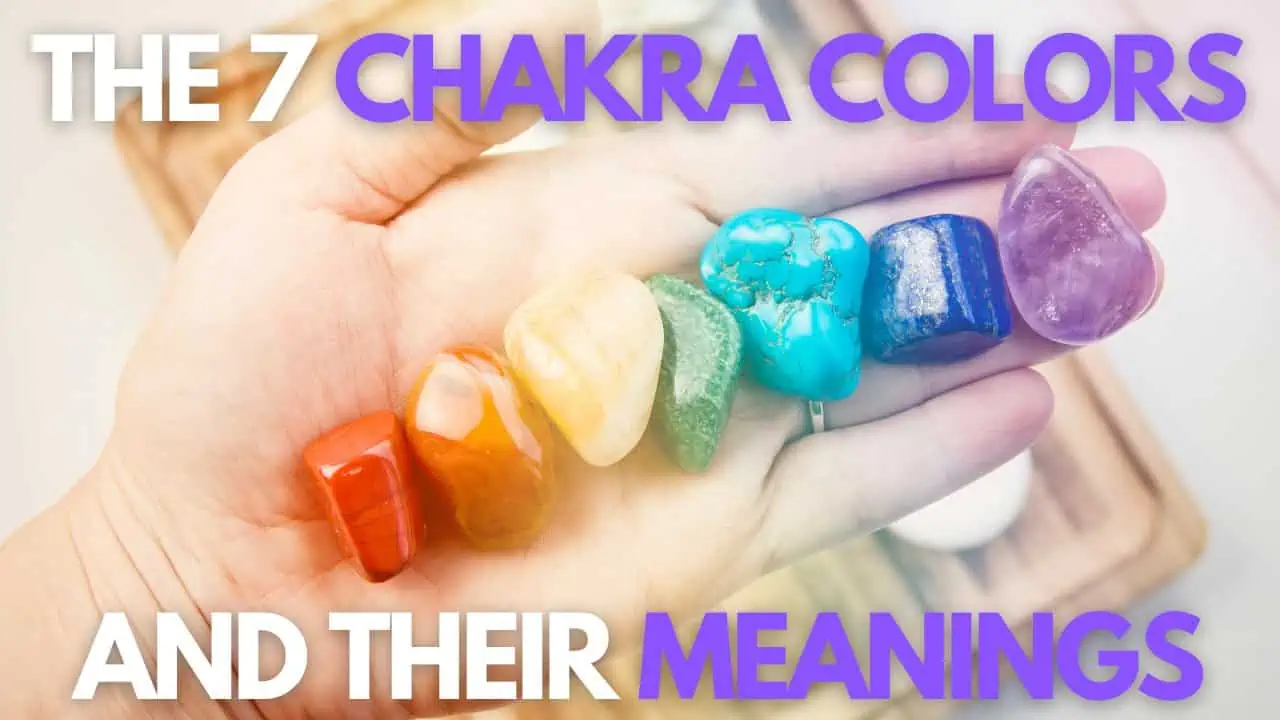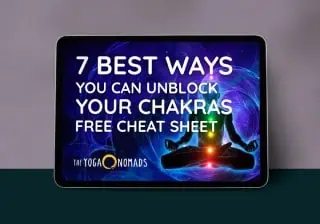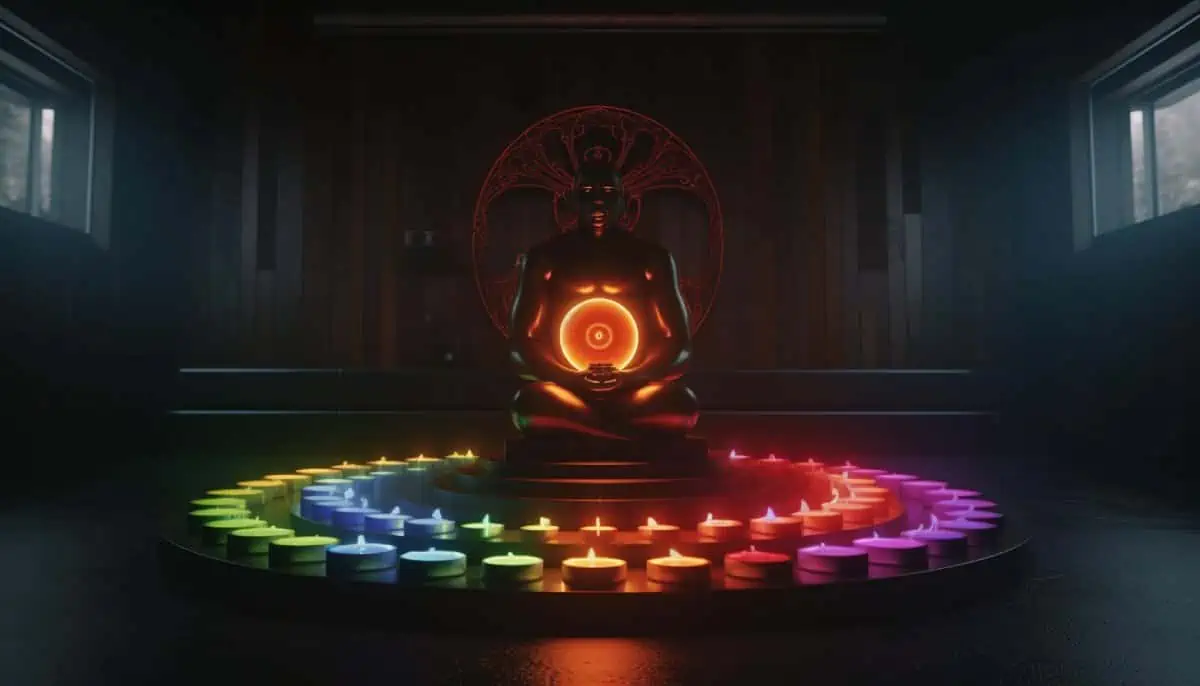Listen to this article:
Even if you don’t know much about chakras, you only have to see a few chakra wall posters to know that the mystical energy system is very colorful. The seven major chakras run from the base of the spine to the crown of the head, each playing a pivotal role in our physical, mental, and spiritual well-being.
Interestingly, all seven energy centers have an associated color that corresponds to the rainbow colors. But are these color representations just for show, or do they carry a deeper meaning? Read on to find out what’s behind the chakra colors.
Prefer video? Watch our Youtube guide on Chakra colors:
Contents
- 1 Chakra Colors At A Glance
- 2 Why Do Chakras Have Colors?
- 3 Where Did Chakra Colors Come From?
- 4 Why Are Chakra Colors Important?
- 5 Root Chakra Color
- 6 Sacral Chakra Color
- 7 Solar Plexus Chakra Color
- 8 Heart Chakra Color
- 9 Throat Chakra Color
- 10 Third Eye Chakra Color
- 11 Crown Chakra Color
- 12 Chakra Colors and Seven Layers of Aura
- 13 Final Thoughts
Chakra Colors At A Glance
Before we dive into the history of the chakra system, here is a quick overview of the seven chakra colors in corresponding order.
Free Cheat Sheet: The 7 Best Ways to Unblock Chakras
Download now- Root Chakra (Muladhara) – Red
- ((Svadhishthana) – Orange
- Solar Plexus Chakra (Manipura) – Yellow
- Heart Chakra (Anahata) – Green
- Throat Chakra (Vishuddha) – Blue
- Third Eye Chakra (Ajna) – Indigo
- Crown Chakra (Sahasrara) – Violet
Why Do Chakras Have Colors?
Every chakra carries a unique frequency, wavelength, and density. In addition, each of the seven chakras is associated with a specific color that matches its vibration. For example, the root chakra’s color red has the longest waves as this energy center has the lowest frequency. Conversely, violet, associated with the crown chakra, has the shortest wavelengths and the highest frequency.
Where Did Chakra Colors Come From?
Chakras were first mentioned in ancient Hindu and yogic texts such as the Vedas and the Upanishads. It is believed that the chakra system dates back to sometime between 1500 and 500 BC. However, the ancient scriptures never mentioned chakra colors, nor did they show them in the illustrations. The old chakra illustrations show their associated divinities, mantras, and shapes, but not colors.
It wasn’t until the 1970s that chakras got assigned colors. In the book “Nuclear Evolution: Discovery of the Rainbow Body,” spiritual author Christopher Hill stated that the chakras are associated with the rainbow colors. This is because the colors of the rainbow combined contain all the colors in the visible spectrum of electromagnetic radiation.
However, just because the chakras are not traditionally linked to colors does not mean there is no reasoning behind this association. Chakras and colors are both vibrating energy, yet you can only see the physicality of a color. Therefore, chakra colors act as a visible representation of the unseen energy centers of the human body.
Why Are Chakra Colors Important?
Chakras not only share their frequency with their associated color, but they possess the same qualities too. Therefore, understanding color psychology will help you learn more about a particular chakra. What’s more, according to color therapy, working with the associated color can help you to heal the corresponding chakra.
For example, wearing red or exposing yourself to a red light enhances your energy, which is a quality of a balanced root chakra. If your root chakra is unbalanced or blocked, you will likely feel sluggish and tired physically and mentally, thus struggling to complete basic tasks. On the other hand, if the root chakra is open, you’ll experience vitality.
In addition, the color green is known to be healing, which is a quality of the heart chakra. For example, someone with a blocked heart chakra struggles to heal from emotional pain, but once the heart chakra is open, healing can take place. Therefore, color therapy suggests you surround yourself with the color green if you want to heal a broken heart.
If you want to gain a deeper understanding of energy healing, consider joining Donna Eden’s Energy Medicine program and discover a roadmap to balance every aspect of your life. You will unlock new gifts, achieve self-mastery, and gain tools to heal anytime life throws you off balance.
Modern-day spiritual practitioners in the Western world use a chakra’s colors in various ways, such as eating foods of that particular shade, wearing crystals that match the hue, or visualizing the color during meditation.
The sections below will discuss how you can use a chakra’s color for chakra healing and aligning.
Chakra Test: Discover Your Strongest, and Weakest, Chakras
Take the free testRoot Chakra Color
The root chakra, known as Muladhara in Sanskrit, is the first chakra and is located at the base of the spine. It carries an earthy, grounding energy and is responsible for our feelings of safety, stability, and security, whether in our emotions, physical body, or the world.
The red color of the root chakra is the densest hue in the chakra color system, with the longest wavelength and lowest frequency of 396 Hz. The Muladhara is the closest chakra to the physical realm energetically.
Red Color Meaning
The color red has various associations, including energy and action. If your first chakra is blocked and you feel unsafe, you will struggle to pull up the driving force to make things happen, even the most basic tasks. Therefore, an unbalanced root chakra affects all areas of your life.
The negative qualities of the color red include danger and war, which are common ways that the root chakra becomes blocked. As a result, red is often used in safety posters and other imagery to represent caution or show that something is wrong. As the condition of the first chakra affects the rest of the chakra system, an imbalance here is a huge alert or “red flag.”
How To Use The Root Chakra Color For Healing
If you feel unsafe in your surroundings, insecure in your body, or unstable in your life’s journey, try nourishing the root chakra with red energy. You can incorporate more red into your life by:
- Eat red foods like watermelons, red apples, tomatoes, radishes, peppers, and pomegranates.
- Wear red-colored crystals or stones on your body or keep them in the home. Fire agate, red jasper, and tiger’s eye are three popular root chakra stones.
- Wear red-colored clothes and accessories.
- Visualize a red ball of energy in the base of the spine.
Sacral Chakra Color
The sacral chakra, known in Sanskrit as Svadhisthana, is the second chakra located in the lower abdomen below the belly button. It is connected with the water element and our emotions and has flow-like energy. It governs our emotional responses and regulation, passion, pleasure, creativity, intimacy, and connection to the senses.
The orange color has a low frequency of 417 Hz as, like all the lower chakras, it is more connected to the physical realm than the spiritual.
Orange Color Meaning
Orange is well known as a happy color that can boost your mood. However, the orange shade also has many other associations that correlate to the sacral chakra, such as passion, enthusiasm, creativity, enjoyment, balance, intimacy, freedom, and expression. When the sacral chakra is balanced, you will experience these qualities.
How To Use The Sacral Chakra Color For Healing
As the color orange enhances creativity and promotes expression, bringing more orange energy to your life will simultaneously activate the second chakra. You can do this by:
- Eating orange foods like carrots, pumpkins, oranges, and apricots.
- Wear orange crystals or stones on your body, such as citrine, orange calcite, and amber. Alternatively, you can keep the crystals in your home or carry them in your bag.
- Wear orange clothes and accessories.
- Visualize an orange ball of energy in the lower belly, close to the male or female reproductive organs.
Solar Plexus Chakra Color
The solar plexus chakra (Manipura in Sanskrit) is the third chakra located in the upper belly just below the ribcage. This energy center governs our personal power and inner fire, with qualities like courage, confidence, self-belief, resilience, and determination. It is connected to the fire element and possesses heating energy that evokes action.
The color yellow has a frequency of 528 Hz. As this is the last of the lower chakras, the frequency is slighter higher, and the vibration becomes lighter.
Yellow Color Meaning
Yellow is strongly associated with hope and positivity, which are qualities many people with Manipura chakra blockages lack. If the solar plexus is open, you will have a high level of self-belief and look at and handle situations with optimism rather than pessimism.
In addition, it is an energizing color that stimulates our nerves, glands, and brain, making us more alert and giving us the push we need to take action towards our goals and dreams. However, from a negative perspective, yellow can link to cowardice. If the solar plexus chakra is depleted, you will likely feel fearful about taking the next step or going after your desires.
How To Use The Solar Plexus Chakra Color For Healing
Bringing more yellow into your life can give you the positivity and energy you require to move forward and strengthen the powerful solar plexus chakra. A few ways to do this are:
- Eating yellow foods like bananas, mangoes, peppers, pineapples, and lemons.
- Place yellow crystals or stones like yellow aventurine, yellow jasper, or yellow calcite in the home or wear them as jewelry.
- Wear yellow clothes and accessories.
- Visualize a yellow ball of energy (or a yellow fire) in the upper abdomen approximately one inch above the belly button.
Heart Chakra Color
The heart chakra, or Anahata in Sanskrit, is the fourth energy center located at the center of the chest. It governs our ability to love and be loved and other positive qualities such as compassion, understanding, empathy, and gratitude. It is associated with the air element and promotes healing and forgiveness.
The heart chakra green color has a frequency of 639 Hz. This chakra is the bridge between the lower and upper chakras; thus, it has the most balanced energy between the physical and spiritual realms.
Green Color Meaning
Green is associated with growth, renewal, and healing. Those with closed heart chakras often need to heal past emotional hurts to follow open this center. Like all colors, green has some negative traits that correlate with the fourth chakra, such as envy and judgment. It is also linked with harmony, which you can experience after releasing a blockage in the heart chakra.
How To Use The Heart Chakra Color For Healing
If you feel that your Anahata chakra is closed off and are struggling to heal past hurts, try infusing your life with more healing green energy by:
- Eat green fruits and vegetables like apples, pears, grapes, broccoli, avocado, kale, and spinach.
- Wear a green stone as a pendant around your neck. Amazonite, aventurine, and green jade all have healing properties.
- Wear green clothes and accessories, particularly those that touch the heart center, such as tops and scarves.
- Visualize a green ball of energy in the center of the chest and imagine it expands to fill the entire upper body.
Throat Chakra Color
The throat chakra, or Vishuddha in Sanskrit, is the fifth energy center of the chakra system, located in the center of the throat. It is responsible for our ability to communicate with others authentically and listen to contrasting opinions. The throat chakra’s blue color has a high frequency of 741 Hz as it is the first of the three upper chakras.
Blue Color Meaning
Light blue is a calming and soothing color associated with trust and loyalty. This relates to the fifth chakra as if you have a blocked throat chakra, you will lack faith in yourself and your opinions and likely tell others what they want to hear rather than what you genuinely want to say. Likewise, someone with an open fifth chakra will stay loyal to themselves by always speaking their truth.
The negative traits are stubbornness and self-centeredness, resulting from an overactive Vishuddha chakra. Another negative association is timidness, which directly relates to a blocked fifth chakra.
How To Use The Throat Chakra Color For Healing
Bringing more shades of blue into your life can boost your communication skills and help you build the confidence to speak your truth. Some ways to improve self-expression are:
- Eating blueberries and drink butterfly pea tea.
- Keep light blue stones like Kyanite and Blue Lace Agate close to you during difficult conversations and public speaking.
- Wear light blue scarves.
- Visualize a light blue ball of energy in the throat and imagine it breaking up any fears or insecurities around self-expression.
Third Eye Chakra Color
The third eye chakra (Ajna chakra) is the sixth chakra, sitting between the eyebrows. It is called the third eye as it is the center of our intuition and spiritual vision. The sixth chakra has creative, reflective energy linked to wisdom and perspective. The more open the third eye chakra is, the more in touch with your inner guidance you will be.
The color indigo (dark blue) has a slightly higher frequency of 852 Hz and shorter wavelengths than the light blue throat chakra color. This is because it is more connected to the spiritual realm than all the chakras below.
Indigo Color Meaning
The indigo color is directly related to intuition and wisdom, the qualities of the third eye chakra. It is also associated with mystical powers and higher levels of perception. Negative traits include easily being triggered or irritated, which is how many people with overactive Ajna chakras feel.
How To Use The Third Eye Chakra Color For Healing
Working with indigo’s energy could help deepen your connection with your spiritual side, tap into your intuition, and strengthen your imagination. You can bring more indigo energy into your life by:
- Eating dark blue and purple foods like blueberries, eggplants, and purple cabbage.
- Put dark blue stones like Sodalite and Lapis Lazuli on your bedside table close to your head while sleeping.
- Wear indigo-colored clothes and accessories, especially headbands.
- Visualize indigo energy between the eyebrows that dissolves mental tension to bring clarity and understanding.
Crown Chakra Color
The crown chakra, or Sahasrara chakra in Sanskrit, is the seventh and last energy center located just above the top of the head. It is the center of spiritual connection and self-mastery, and ancient yogis believed opening this chakra led to enlightenment.
As the crown chakra’s energy is entirely spiritual, the violet color of this energy center has the highest frequency and shorter wavelength of them all, at 963 Hz. This high vibration is known for awakening intuition and activating the Pineal Gland.
Violet Color Meaning
Violet represents wisdom and spirituality. It encourages self-knowledge, spiritual growth, and the ability to get in touch with our innermost thoughts. However, as a playful and whimsical hue, purple is also associated with escaping reality and hallucinations of magical images, which can happen if the crown chakra becomes overactive.
How To Use The Crown Chakra Color For Healing
As the highest and most spiritual chakra, the crown chakra is the most difficult to open, especially if the lower chakras are blocked. However, infusing your life with purple could help to create more spiritual energy and evoke a connection with the divine. Some ways to draw in higher consciousnesses are:
- Eating high-vibration purple foods like eggplant, purple cabbage, purple sweet potatoes, and rice berries.
- Meditate with purple crystals like amethyst, tanzanite, and charoite.
- Wear purple clothes, especially hats.
- Visualize purple energy in the shape of the crown floating above the top of the head, connecting you to the universe.
Chakra Colors and Seven Layers of Aura
Chakras share many similarities with the aura. For example, there are seven chakra energy centers and seven aura layers. Although each aura layer has a color, unlike the chakra system, the color of some aura layers can change depending on the condition. Here is a brief overview of the seven layers of the aura, their associated colors, and their connection to the chakras.
1st Layer: Etheric
- Connected to the root chakra
- Closest to the physical body
- Represents all that makes up the human body, such as muscles, tissues, and bones
- Appears as a bluish-gray color
2nd Layer: Emotional
- Connected to the sacral chakra
- Represents emotions and feelings
- It can appear as any of the rainbow colors
- Can appear muddy colored in times of emotional stress
3rd Layer: Mental
- Connected to the Solar plexus Chakra
- Represents thoughts, cognitive processes, and condition of the mind
- Bright yellow color
4th Layer: Astral
- Connected to the heart chakra
- Represents forming our astral cords (connections) with others
- Rose pink color
5th Layer: Etheric Template
- Connected to the throat chakra
- Represents the entire blueprint of the body on the physical plane, including your identity, personality, and energy
- Varies in color
6th Layer: Celestial
- Connected to the third eye chakra
- Emits a powerful vibration
- Represents a connection to the Divine and all other living things
- Pearly white color
7th Layer: Ketheric
- Connected to the crown chakra
- Furthest away from the human body (estimated to be around 2-3 feet away)
- Represents connection with the universe
- Holds information about your soul and previous lives
- Pulsates rapidly and vibrates at the highest frequency
- Gold color
Final Thoughts
Although the chakra colors are not part of the traditional chakra system teachings, they could hold great value nonetheless. As the associated chakra colors share the same frequency and many of the same qualities of the energy centers, we can use the rainbow in energy healing to bring harmony to our bodies, minds, and souls.




